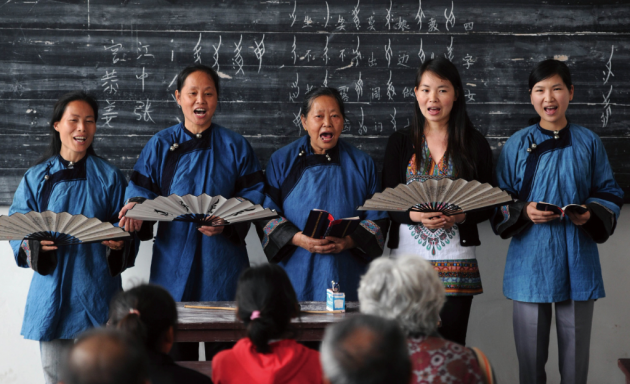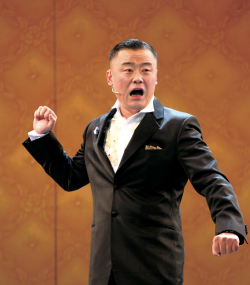When Words Fail: It’s Time to Give Them A Helping Hand

Phonemica is a virtual library for the languages of China, a place where recordings of languages spoken by many millions of Chinese speakers, or only a handful, can be preserved, hopefully for generations to come. Talk sat down with Phonemica’s founders, Steve Hansen and Kellen Parker, to find out more about their linguistic mission.
 Since going live in April of this year, Phonemica, a wholly crowd-sourced operation, has collected 289 recordings, with a registered user base of 7,452 people, who are all welcome to contribute to the translations (into Mandarin, Pin Yin and English) that accompany each recording.
Since going live in April of this year, Phonemica, a wholly crowd-sourced operation, has collected 289 recordings, with a registered user base of 7,452 people, who are all welcome to contribute to the translations (into Mandarin, Pin Yin and English) that accompany each recording.The recordings, which people make of themselves, friends or relatives speaking one of China’s many languages, uses the language to tell a story, a snapshot of their life or a piece of family folklore.
Before we dig too deep into the ins and outs of Phonemica, it might be helpful to get into a little background about Chinese languages. Estimates put the total number of living languages in China at 292, from at least nine language families.
Following efforts to standardise Mandarin dialects from both the Kuomintang and Communist governments of the 20th century, a standardised version of Mandarin, known as Putonghua, has been the county’s lingua franca for more than half a century.
The word 'Putonghua' was defined in October 1955 by the Minister Of Education in Mainland China as follows: “Putonghua is the common spoken language of the modern Han group; the lingua franca of all ethnic groups in the country. The standard pronunciation of Putonghua is based on the Beijing dialect. Putonghua is based on the northern dialects [i.e. the Mandarin dialects], and the grammar policy is modelled after the vernacular used in modern Chinese literary classics.”
There are obviously a number of practical reasons why a common language is needed in a country as large and unwieldy as China – not only for the purposes of governing, but also for domestic travel, trade and to promote a standardised educational curriculum.
As Steve Hansen says: “You will find some people who resent Putonghua, but it’s pretty hard to find people who don’t realise it’s kind of necessary.”

Unfortunately, the promotion of a single language is, unavoidably, to the detriment of the many and varied languages that have traditionally been a major part of China’s varied cultures. This is the situation as Hansen and Parker found it in 2007 when they were both blogging about Chinese language in Beijing and Nanjing respectively.
“So I was living in Nanjing and started trying to learn Mandarin and there was the Mandarin I was learning in textbooks, and then different Mandarin I was hearing on the street,” Parker said.
“I also had friends from Suzhou and other places that are speaking a completely different language to me, so that got me interested in the language situation here. I thought it would be interesting to have a place where people could come to listen to all of these different accents and different stories and whatnot.”
Parker approached Hansen about teaming up and together they began germinating the idea that would eventually become Phonemica. According to the pair, it was soon apparent that the crowd-sourcing element to the site (and its funding, with more than USD 4,000 raised until now on Indiegogo) would be vital.
Not only would it be impractical for the two of them to hop from town to town gathering recordings from (in many cases) elderly dialect speakers along the way, but it would also be virtually impossible for them to draw out the interesting, folklore-type stories they are hoping to collate.
“It’s very unusual for someone to speak their home dialect to an outsider, a foreigner definitely, but even other Chinese. So if you get the user generated content - you can get a son interviewing a parent, you can get those interesting stories... that intimate stuff,” Hansen said.
 The quality of the recordings thus far uploaded onto the site varies in terms of both the recording quality and content, but there are already some gems on the site.
The quality of the recordings thus far uploaded onto the site varies in terms of both the recording quality and content, but there are already some gems on the site.One is the touching story, told in a dialect spoken in a district not far from Shanghai, of a grandparent’s love, following a chance meeting during Shanghai’s war with the Japanese.
Another, from a Changzhou-native, tells the story in that local dialect, of how his great-grandfather killed his neighbour and (not surprisingly) was forced to flee from his home in the southeast, eventually settling in Changzhou.
It’s in this colloquial approach that many find the appeal of Phonemica, including volunteer Cecilia Wang.
“I think it’s what we Chinese should’ve been doing a long time ago. I think it’s really important to preserve dialects. It’s part of our culture, and it’s something we should preserve. And the way it’s being done allows people to tell their own stories. I liked that a lot, so I joined up,” she told Talk.
When asked about the hardline approach some Shanghainese speakers have to preserving language – by encouraging their children to only marry other Shanghainese, for example, Hansen and Kellen are pragmatic.
“My parallel is always Europe. If you go to Norway, you’ll find a lot of people speak English, but that doesn’t mean they give up Norwegian,” Hansen said.
Parker adds: “My nephew speaks English, Albanian and Mandarin, and he’s only ten, so I believe it’s possible. Some parents do believe that if they teach their child Shanghainese, their Mandarin will suffer and so they should just focus on Mandarin. I think theirs is a myth about our inability to process multiple languages.”
Though the feedback they get about the Phonemica project is overwhelmingly positive, there are some on going misunderstandings about what it is they do, as well as the broader fallacies about language learning and retention.
 “There’s this issue we’ve run into in the Chinese language press when we say we are ‘preserving language’. In Chinese there are two words they translate this as – bao hu and bao cun – bao hu is protecting, safeguarding, stopping it from disappearing, and bao cun is just archiving,” Parker explained.
“There’s this issue we’ve run into in the Chinese language press when we say we are ‘preserving language’. In Chinese there are two words they translate this as – bao hu and bao cun – bao hu is protecting, safeguarding, stopping it from disappearing, and bao cun is just archiving,” Parker explained.“The thing is, we can’t really bao hu. We can’t tell people, you have to teach your child Shanghainese. That’s something for families to decide. What we can do is give people who do value [these languages] the outlet, the platform and the opportunity to realise they’re not the only ones who value this.”
As for the future of the site, its founders have big plans - even talking about one day making Phonemica a Chinese language equivalent of another crowd-sourced site – Wikipedia.
More immediately, Parker hopes to offer some kind of value to anyone interested in the preservation of Chinese languages; perhaps particularly those with an academic interest.
“I want this to be linguistically valuable. I would like, eventually, for academics to be able to use a subset of our recordings as a linguistic partner for their own academic research,” he said.
Web: www.phonemica.net

